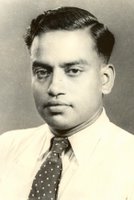

It was a day of Naachiyaar Thiruk kolam* in Srirangam. It was the later part of 1970s. The Tamil poet, Thiruloka Seethaaram and other friends visited my father, nearing dusk. When refreshments were over, talks wandered here and there; topics were changing and discussions cropped up to dissolve in further musings.
My father was ever a terrible conversationalist and table talks were always lively whenever he was around. Slowly the drift was towards Shakespeare. My father commented that without the help of commentators like Bradley and others, it was always difficult to understand the Bard and hence the perennial value of annotations on Shakespeare.
Thiruloka Seethaaram, a man of original thinking and independent development, sprang on the moment and countered my father saying, " how can you say that ? has the poet written directly for you or for any mediator to expound to others ? what are these commentators? throw them ! go to the poet directly ! labour pains and poetic strains can never be had by proxy."
My father was a man never yielding to a point in arguments. Nothing was sacrosanct and nobody towered high when he began to charge with his battery of arguments. He immediately countered back the Poet saying, " all such arguments are ok with regard to geniuses like yourself. But what of the common run and less endowed like us who need some prompting at least".
Immediately the piece of soliloquy in Hamlet, ‘to be or not to be’, was taken as a test piece and analyzed .
After some time other friends who were there were already feeling a little sleepy and assumed all sorts of resting postures. But the two concerned were not aware of the passing time, it was already 11 pm, and with recurrent renewal of energy they were going on and on. Thiruloka Seethaaram was arguing that all commentaries were a waste standing in between the text and the reader. The text can and should speak for and by itself, that Prof. C S Kamalapathi, who was my father’s friend and guide in dramas had exploited the emotional involvement of my father and injected such slavish dependency on the commentators. ( I was wondering how my father would retort to that) But my father took it in his strides and replied , “ not so ..the said Professor out of sympathy for the students that they need not unnecessarily waste time on already clarified aspects has brought to the knowledge of us such foregone efforts, and thereby we can start from others’ endpoints. It is the natural way of growth, to learn, to accumulate lessons learnt and pass it on to the coming generations. Where the forerunners stumbled that is the light for the later to better. The ways of the exceptional cases like the poet do but stress the natural process and never disprove it.
At last it was half an hour past midnight and the two came to a halt of mutual appreciation , accepting to disagree . I remember it vividly even now as a battle of giants.
Srirangam Mohanarangan
*Nachiyar Thirukkolam --In Srirangam temple during the month of November-December a festival of recitation of the whole corpous of 4000 divine hymns of Alwars is conducted for the past 1500 years. In the middle of the 21 days long festival comes Vaikunta Ekadasi, on which day the Deity himself act out the role of a religious aspirant towards salvation. The day previous to that , the Deity adorns himself as the goddess consort, Nachiyaar( the Lady of the divine household). It is called Nachiyar Thirukkolam- in the Guise of the Lady.
*my father-R.Venugopal